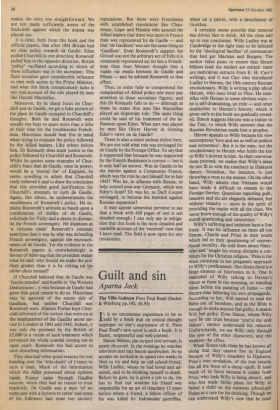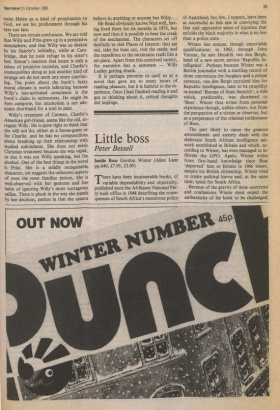Guilt and sin
Aparna Jack
The Villa Golitsyn Piers Paul Read (Secker & Warburg pp.192, £6.95) It is an uncommon experience to be so held by a book that no critical thought impinges on one's enjoyment of it. Piers Paul Read's new novel is such a book. It is fluent, suspenseful and well-plotted.
Simon Milson, pin-striped civil servant, is newly divorced. In the evenings he watches television and eats bacon sandwiches. So he accepts an invitation to spend two weeks in Nice to try and help an old school-friend, Willy Ludley, whom he had loved and admired, said to be drinking himself to death. Before he goes, he is given a job to do. He has to find out whether his friend was responsible for an act of treachery 13 years before where a friend, a fellow officer of his was killed by Indonesian guerrillas, when on a patrol, with a detachment of Gurkhas.
It certainly seems possible that remorse has driven him to drink. All the clues add up to one conclusion. Willy Ludley was at Cambridge at the right time to be infected by the 'ideological bacillus' of communism that had got Maclean and Burgess. The author takes pains to ensure that Simon Milson (and the reader) are misled: there are meticulous extracts from E. H. Carr's writings, and it was Carr who introduced Ludley to Herzen, the 19th-century Russian revolutionary. Willy is writing a play about Herzen, who once lived in Nice. He identifies with Herzen in some obvious ways — he is self-dramatising, an exile — and other similarities to Herzen's history, which is given early in the book are gradually revealed. Simon suggests Herzen was a traitor to the Tsar, to which Willy answers that the Russian Revolution made him a prophet.
Herzen appeals to Willy because his view encompasses 'love and sex as well as politics and economics'. But it is the man, not the revolutionary in Herzen who holds the key to Willy's interest in him. As their conversations proceed, we realise that Willy's ideas do not fit in with the treachery in Djakarta theory. Socialism, for instance, is just throwing a crust to the masses. On the other hand, Willy admits that Vietnam would have made it difficult to remain in the Foreign Service. Questions regarding guilt, remorse and sin are elegantly debated, but without tenacity — more in the spirit of providing the reader with all the clues. We never know enough of the quality of Willy's moral questioning and conscience.
Willy's suffering and isolation have a fine irony. It was his influence on them all (on Simon, Charlie and Priss) in their youth which led to their questioning of conventional morality. He told them about Nietzsche and 'taught his young disciples a contempt for the Christian religion.' Priss is the most consistent in her pragmatic approach to Willy's predicament. She thinks there is a large element of histrionics in it. One is reminded of Willy talking to Herzen's statue at three in the morning, or standing silent before the painting of Judas — the sincere man believing his own propaganda. According to her, Will started to read the Bible out of boredom, and as the Bible is enough to make anyone feel guilty, it makes Will feel guilty. Even Simon, whom Willy says he can trust because 'you're my only failure', cannot understand his remorse. Unfortunately, we see Willy only through the eyes of the other characters, and this weakens the effect.
When Simon tells them he has known all along that they cannot live in England because of Willy's treachery in Djakarta, Priss's own revelation, of the true reason, has all the force of a damp squib. It loses much of its force because it comes from Priss, who feels Willy is being absurd, and who has made blithe plans for Willy to father a child on the runaway school-girl Helen as a cure for his drinking. Though we can understand Willy's view that he must resist Helen as a kind of propitiation to God, we see his predicament through his eyes too late.
There are certain confusions. We are told that Willy and Priss grew up in a permissive atmosphere, and that Willy was so shaken by his fiancee's infidelity, while at Cambridge, that he took refuge in his sister's bed. Simon's reaction that incest is only a taboo of primitive societies, and Charlie's cosmopolitan shrug at just another kind of strange sex do not seem any more convincing. The point about the book's fuzzy moral climate is worth labouring because Willy's late-activated conscience is the book's claim to seriousness. He might be hors categorie, but alcoholism is not adequate shorthand for a soul in pain.
Willy's treatment of Carmen, Charlie's American girl-friend, seems like the old, arrogant Willy. He is quite right to think that she will not "do, either as a house-guest or for Charlie, and he has no compunctions about breaking up their relationship with studied unkindness. She does not merit Christian treatment because she was vapid, or else it was not Willy speaking, but the alcohol. One of the best things in the novel is Priss. She is a solidly recognisable character, yet suggests the unknown aspects of even the most familiar person. She is well-observed with her gestures and her habit of ignoring Willy's more outrageous sallies. There is pluck in the way she stands by her decision, pathos in that she cannot believe in anything or anyone but Willy.
Mr Read obviously knows Nice well, having lived there for six months in 1979, but now and then it is possible to hear the creak of the mechanism. The characters set off dutifully to visit Places of Interest: they eat out, take the boat out, visit the castle; and the expedition to the mountains reads like a set-piece. Apart from this contrived variety, the narrative has a sameness — Willy Ludley getting drunk.
It is perhaps perverse to cavil so at a novel that gave me so many hours of reading pleasure, but it is faithful to the experience. Once I had finished reading it and got to thinking about it, critical thoughts did impinge.







































 Previous page
Previous page